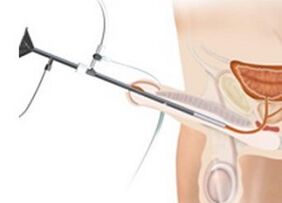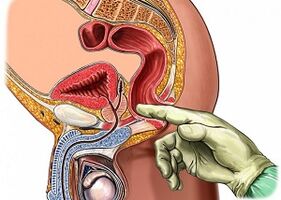Prostatitis is characterized by a complex inflammatory process in the prostate gland. The risk group consists of men aged 40 and older who lead a sedentary lifestyle. In the acute form, the first symptoms occur with purulent discharge in the urine, severe pain syndrome and a rise in body temperature to 40 degrees. Chronic prostatitis is less dangerous than acute, but has a more latent developmental picture. The danger lies in irreversible disorders associated with the functioning of sexual function.
Features of the course of prostatitis
Symptoms of prostatitis, sedentary lifestyle, hypothermia, malnutrition begin to bother men.
The course of the disease can be characterized by one of two forms:
- Acute prostatitisis defined as a purulent discharge in the urine. Specific causes are associated with pathogenic microflora. Antibiotic treatment is ineffective.
- Chronic- develops as a result of improper or ineffective treatment. The signs are not as clear as they used to be.
During remission, the pathological symptoms often disappear completely. Exacerbation of chronic prostatitis does not bother the patient as clearly as in the primary acute form. In most cases, a stagnant course of the disease is diagnosed as a result of a sedentary lifestyle against the background of chronic diseases due to low blood circulation in the pelvic organs.
The main symptoms of prostatitis are divided into three groups by doctors:
- Defects in the urinary system, manifested by disorders of urinary excretion;
- Sexual disorders characteristic of an enlarged prostate;
- Development of nerve pathologies.
Inflammation of the prostate causes a decrease in the production of a special secretion that protects sperm activity. As a rule, resistance to adverse effects is reduced, and the probability of successful fertilization of a female egg is close to a minimum.
According to medical statistics, the disease affects not only the elderly, but also quite young men. The risk group consists of the stronger sex from the age of 40. Doctors emphasize that the main emphasis is on the prevention of pathological development in the small pelvis and preventive measures.
Symptomatic picture
Symptoms of prostatitis are primarily represented by pain syndrome. Unpleasant sensations in acute inflammation may include stabbing, cutting, or pain. Decreased performance causes sleep disturbances. Already in the early stages of prostate enlargement can be determined by pain in the pelvic region. In some patients, it develops during urination and stool. Pain increases during erection and ejaculation.
Pain due to mechanical impact on the walls of the urethra is almost always associated with movement.
Problems with urine flow concern almost every patient and in any form. Appearance:
- Wrong urge to urinate;
- feeling of incomplete emptying of the bladder.
A man may need to make an effort to urinate, and the jet is slow and intermittent. Acute inflammation often causes urination.
In addition to the listed symptoms of prostatitis in the acute course of the disease, the following manifests itself:
- pain in muscles and joints;
- increase in body temperature to 40 degrees;
- fever, chills;
- swelling in the groin area;
- discharge from the urethra;
- burning and cramps when urinating;
- Strips of blood and pus in the urine.
Motivational factors
The main causes of prostatitis can be summarized in the following list:
- Sexually transmitted infections. Trichomonas, mycoplasma, chlamydia, gonococci, Escherichia coli, enterococci can cause damage to the urinary tract and prostate tissues.
- A sedentary and sedentary lifestyle contributes to the development of stagnant and inflammatory processes in the pelvic organs.
- Lymphatic and circulatory disorders.
- Continuous interruption or artificial growth of sexual intercourse, prolonged abstinence causes disorders of the prostate gland.
- Regular mental stress, excessive physical exertion, stressful situations also affect men's health and lead to the development of prostatitis.
- Hypothermia, frequent colds and the consequent decrease in immunity lead to inflammatory processes in the reproductive organs.
- Hormonal diseases.
Treatment
It will not be possible to get rid of the pathological symptoms of acute or chronic prostatitis in a short time.
When choosing certain treatments, it is important to determine the type and form of the disease through diagnostic tests.
Medications

Antibiotics are used to diagnose bacterial prostatitis. If the inflammatory process did not cause an infection, there is no point in such treatment. The choice of a specific antibiotic is made by the attending physician after the detection of a microorganism that causes bacterial damage to the prostate gland.
In most cases, the drug should be taken for at least 7 days. Alpha-blockers and antispasmodics help relieve pain. Systematic intake of this group of drugs helps to relax the muscles of the bladder and the prostate itself. This improves urine flow and reduces the overall clinical appearance.
Intravenous fluids and diuretics are indicated, especially for men with severe pathology. It improves urine flow. In addition, in this way you can stop the process of intoxication of the body.
Non-bacterial prostatitis is treated with antipyretic, analgesic, anticholinergic drugs. During constipation it is necessary to use laxatives and suppositories based on Vaseline oil.
Supportive care
The important steps in adjunctive therapy for drug treatment are:
- bed rest;
- complete rest;
- drink at least 2 liters of plenty of fluids a day;
- hot baths.
In acute urinary retention, a temporary suprapubic fistula is prescribed. An alternative approach is regular catheterization of the bladder. Doctors prescribe such treatments only when drug treatment is ineffective. Patients should not forget the contraindications to treatment, cycling and prolonged sitting on hard surfaces, hypothermia of the body.

Prostate massage is prescribed from the first days of prostate diagnosis. This method helps to reduce the pressure of the enlarged gland on the urethra, thereby improving urinary excretion and reducing induration.
Compliance with a diet that excludes spicy and fatty foods, as well as alcohol and carbonated beverages allows you to normalize your overall well-being.
Surgery
In cases where drug treatment has no effect on the treatment of prostatitis, surgery is required. In exceptional cases, the flow of urine is blocked by stagnant flow. Surgical treatment is also invaluable here. The contraindication to surgery is the patient's reproductive age. In young men, surgery can cause infertility.
Transurethral resection of the prostate is a surgical incision of all inflamed tissue. Prostatectomy is performed to completely remove the prostate, adjacent tissues, and seminal vesicles. The negative consequences of such an intervention are urinary incontinence and impotence. This type of medical care is necessary for the malignant nature of the pathology. It allows you to get rid of the problem of the inflammatory process in the prostate gland once and for all.
Prostatitis is a chronic and insidious disease with persistent remission. It is not always possible to completely cure, so eliminating the underlying symptoms is a task that every attending physician is trying to accomplish. It is impossible to determine exactly how long it will take for them to disappear completely. In most cases, urologists make comforting predictions.
Alternative therapy
Not only medical methods, but also folk remedies are used in the treatment of the disease.
The bee is dead
2 teaspoons of alcohol tincture is prepared. podmore and 200 ml of alcohol or vodka. 40-60 drops 3 times a day on an empty stomach, depending on the patient's weight. Course therapy - 25 days. The composition of bee worms contains unique components that have a therapeutic effect on problems related to the male reproductive system.
Broth with 2 teaspoons added. honey, 1 tsp. For 1 cup of hot water, cook on low heat for 10 minutes. Then the tool should be insisted for about 3-4 hours. Use is indicated on 2 tablespoons. l. twice a day before meals. The optimal duration of treatment with this tool is 1 month. Then you should take a break for 7-10 days and continue treatment if there is no improvement.
Pumpkin Seeds
Pumpkin seeds should be ground in a coffee grinder before use. Take 2 tablespoons daily on an empty stomach. l. , washed down with a glass of water diluted 2 teaspoons inside. natural honey.
You can add a few drops of fresh parsley juice to the puppies.
Chestnut
Raw materials are mixed in equal proportions (10 g each):
- dried licorice root;
- Leaves of berries, chestnuts, knots and castor oil plants.
To increase the effect, you can add 15 g of dandelion, camphor and beans to each. Every day you need to prepare a fresh decoction of 1 tbsp. l. mixed vegetable raw materials and 0, 5 liters of water. Boil for 10 minutes, then leave for another half hour. Drink 4 doses immediately before meals. The course is 30 days.
Prevention
In the clinical picture of prostatitis, the manifestation of symptoms contributes to the formation of inferiority complexes. This causes stressful situations and depressed mood in men. Many patients are characterized by irritability, a tendency to confrontation. Aggressive behavior interferes with normal communication.
In most cases, you should seek the help of an experienced psychologist. After all, sexual immorality has a devastating effect not only on a man's mood but also on his life. Therefore, psychological rehabilitation is no less important than drug treatment.
Doctors advise to avoid hypothermia and excessive physical exertion. An effective way to prevent prostatitis is an active sex life with a regular partner. Prolonged abstinence, incomplete ejaculation is contraindicated. From the age of 40, it is necessary to limit the use of alcohol and stop smoking. The main focus should be on moderate exercise and vitamin therapy.






























